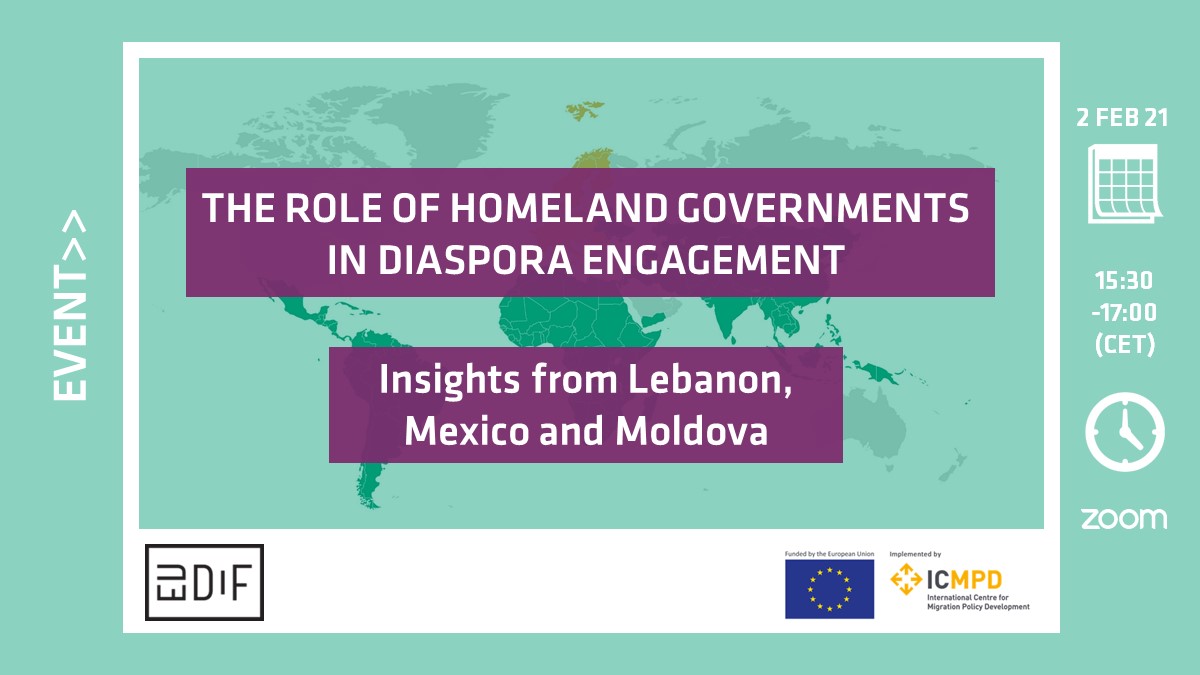
On Tuesday 2 February we welcome you to join our webinar to hear from representatives of Lebanon, Mexico and Moldova on the role of homeland governments in diaspora engagement.
At the end of 2020, we finished our mapping of diaspora engagement around the world, producing over 100 country factsheets spanning 6 regions: Africa, Asia, Central Asia & Easter Europe, Latin America & the Caribbean, and the Pacific. The research taught us a lot about different approaches and priorities in diaspora engagement and identified many opportunities for further research, discussion and peer-to-peer learning.
A recurring question from both the research and the meetings EUDiF has organised is: What is the role of the homeland government in diaspora engagement? And, linked to this, how do institutional frameworks relate to effectiveness of government-diaspora engagement?
On 2 February 2021, 15:30 – 17:00 (CET) we are delighted to welcome three government representatives from Lebanon, Mexico and Moldova to share their insights on institutionalising and enabling diaspora engagement.
The event will be hosted by ICMPD’s Head of Global Initiatives, Oleg Chirita, on Zoom, with interpretation in English, Arabic, French, Romanian and Spanish. Oleg will be joined by George Washington University’s Professor Jennifer Brinkerhoff as discussant.
Panellists:
- Ambassador Vazken Kavlakian, Acting Director of Diaspora Affairs, Ministry of Foreign Affairs and Emigrants, Lebanon
- Ambassador Iván Sierra Medel, Executive Director, Instituto de los Mexicanos en el Exterior, Mexico
- Ms Nadejda Zubco, Head, Bureau for Diaspora Relations, Moldova
More on the mapping…
107 country factsheets are available to download via the EUDiF interactive map, where you can also compare country profiles. We hope that this living research will be used widely to inform the migration and development agenda on diaspora engagement policies and programmes. For EUDiF, the findings serve as the foundations of our dialogue activities, Capacity Development Lab and Diaspora Professionals 4 Development mechanism.
Country factsheets:
- Africa: Algeria, Angola, Benin, Botswana, Burundi, Cabo Verde, Cameroon, Chad, Comoros, Congo, Djibouti, DRC, Egypt, Equatorial Guinea, Eritrea, Eswatini, Ethiopia, Gabon, Ghana, Guinea, Guinea Bissau, Ivory Coast, Kenya, Liberia, Libya, Mali, Mauritius, Morocco, Niger, Nigeria, Rwanda, Senegal, Seychelles, Somalia, Sudan, Tanzania, Togo, Tunisia, Uganda, Zambia, Zimbabwe
- Asia: Afghanistan, Bangladesh, Cambodia, China, India, Indonesia, Malaysia, Maldives, Mongolia, Myanmar, Nepal, Pakistan, Philippines, Sri Lanka, Thailand, Vietnam
- Eastern Europe & Central Asia: Armenia, Azerbaijan, Georgia, Kazakhstan, Kyrgyzstan, Moldova, Tajikistan, Turkmenistan, Ukraine and Uzbekistan
- Latin America & Caribbean: Argentina, Barbados, Bolivia, Brazil, Chile, Colombia, Costa Rica, Cuba, Dominica, Dominican Republic, Ecuador, El Salvador, Guatemala, Guyana, Haiti, Honduras, Mexico, Nicaragua, Jamaica, Paraguay, Peru, Suriname, Trinidade and Tobago, and Venezuela
- Middle East Egypt, Iraq, Jordan, Lebanon, Palestine
- Pacific: Fiji, Federated States of Micronesia, Kiribati, Marshall Islands, Nauru, Niue, Papua New Guinea, Samoa, Tuvalu, Timor Leste, Tonga, Vanuatu
EUDiF will update the facts sheets during the project. Additional translations of various fact sheets will also be made available via the Library in the coming weeks.
We welcome feedback on the factsheets, do not hesitate to get in touch.